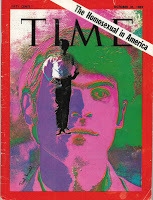Larry Benjamin's Blog: Larry Benjamin's blog - This Writer's Life - Posts Tagged "lgbt-fiction"
Opium and The Butterscotch Prince
A few months ago, I met my friend Brenda for lunch—we’ve been friends since my sophomore year of college—we don’t see each other often but when we do, we simply pick up our friendship, our conversation, where we last left off. After that lunch, I walked her back to her car and hugged her as is my habit. Later, she emailed me, “You know,” she wrote, “After I left, I realized I could smell you and I realized you smell exactly the same.” It was then that I remembered I’ve been wearing the same scent, Cartier’s Santos for decades. It seemed to me she took comfort in that familiarity, that sameness.
Years ago when Toby, our silky terrier, had to be in the hospital over a few days, the attending vet suggested we bring in one of my worn t-shirts to comfort and calm him. Now, years later, on the rare occasions I must be away overnight for work, I leave the t-shirt I slept in the night before for Toby. Otherwise he sits by the kitchen door all night waiting for me to come home.
If you read last week’s blog post, you know I wrote about sounds, particularly the role of sound, of music, in my writing. This week, I turn my attention to smells.
When I approach a story, I try to give it dimension. I may only be writing words on a page, but I try to manifest those words corporeally in the material world. As I write, I see my settings, my characters in a movie. Perhaps, that’s not right. I see them as living. While I’m writing I live in the story. The fictional world becomes real for me. There is color and furniture and sound; often music is playing nearby or in the background. The characters have words and feelings, but they also have density, and their own particular smells.
This was perhaps truest in my first book, What Binds Us.
When protagonist and narrator Thomas-Edward first meets main character Dondi, he tells us:
“I smelled him before I saw him or even heard his voice. It was a smell that was peculiarly his own—clove cigarettes and sex. A scent that clung to him even when he was freshly showered.”
We know very little about Dondi’s mother Mrs. Whyte—we never learn her first name—but we know what she smells like. The first time he meets her, Thomas-Edward notes:
“She wore Opium. Its opulent scent wafted over me.”
When he parts from her that first summer, he again notes her scent:
“All of a sudden the steel went out of her posture and she leaned into my embrace. Her lips touched my cheek. The scent of Opium enveloped me. It was like falling into a soft-scented cloud. I could get lost in that smell. I could close my eyes and no one would ever find me.”
And when he meets her again after many years absence he remarks:
“She entered the room behind me. She still wore Opium. The smell took me back all those years to the first time I’d met her, when she’d descended the stairs so elegantly and called me Thomas-Edward.”
Thomas-Edward notices smells. A lot. Including the smell of old money:
“I ran up behind him, looking over his shoulder into a high ceilinged room. Pale sunlight filtered in through half-open shutters. The walls were lined with glass-fronted cabinets holding leather bound books; the gilt lettering on their spines gleamed dully. The room smelled of paper and tobacco and leather.”
And the smell of betrayal:
“In the breaking light I could see that his mouth was bruised and raw-looking. He smelled of sex and someone else’s cologne. I held him and watched the new day dawn.”
Thomas-Edward may have smelled Dondi, his first love, but he tastes Matthew, his endless love:
“He tasted of butterscotch. I called him my butterscotch prince. He snuck across the street and stole peonies from Mrs. Chang’s garden and presented me with a contraband bouquet. He told me I was his world.”
This last was not quite random. Research has shown that our body odor, can help us subconsciously choose our partners - read more here. Further, kissing is thought by some scientists to have developed from sniffing; that first kiss being essentially a primal behavior during which we smell and taste our partner to decide if they are a match. Thomas-Edward and Matthew are a match.
Read more about smells and emotions here.
Years ago when Toby, our silky terrier, had to be in the hospital over a few days, the attending vet suggested we bring in one of my worn t-shirts to comfort and calm him. Now, years later, on the rare occasions I must be away overnight for work, I leave the t-shirt I slept in the night before for Toby. Otherwise he sits by the kitchen door all night waiting for me to come home.
If you read last week’s blog post, you know I wrote about sounds, particularly the role of sound, of music, in my writing. This week, I turn my attention to smells.
When I approach a story, I try to give it dimension. I may only be writing words on a page, but I try to manifest those words corporeally in the material world. As I write, I see my settings, my characters in a movie. Perhaps, that’s not right. I see them as living. While I’m writing I live in the story. The fictional world becomes real for me. There is color and furniture and sound; often music is playing nearby or in the background. The characters have words and feelings, but they also have density, and their own particular smells.
This was perhaps truest in my first book, What Binds Us.
When protagonist and narrator Thomas-Edward first meets main character Dondi, he tells us:
“I smelled him before I saw him or even heard his voice. It was a smell that was peculiarly his own—clove cigarettes and sex. A scent that clung to him even when he was freshly showered.”
We know very little about Dondi’s mother Mrs. Whyte—we never learn her first name—but we know what she smells like. The first time he meets her, Thomas-Edward notes:
“She wore Opium. Its opulent scent wafted over me.”
When he parts from her that first summer, he again notes her scent:
“All of a sudden the steel went out of her posture and she leaned into my embrace. Her lips touched my cheek. The scent of Opium enveloped me. It was like falling into a soft-scented cloud. I could get lost in that smell. I could close my eyes and no one would ever find me.”
And when he meets her again after many years absence he remarks:
“She entered the room behind me. She still wore Opium. The smell took me back all those years to the first time I’d met her, when she’d descended the stairs so elegantly and called me Thomas-Edward.”
Thomas-Edward notices smells. A lot. Including the smell of old money:
“I ran up behind him, looking over his shoulder into a high ceilinged room. Pale sunlight filtered in through half-open shutters. The walls were lined with glass-fronted cabinets holding leather bound books; the gilt lettering on their spines gleamed dully. The room smelled of paper and tobacco and leather.”
And the smell of betrayal:
“In the breaking light I could see that his mouth was bruised and raw-looking. He smelled of sex and someone else’s cologne. I held him and watched the new day dawn.”
Thomas-Edward may have smelled Dondi, his first love, but he tastes Matthew, his endless love:
“He tasted of butterscotch. I called him my butterscotch prince. He snuck across the street and stole peonies from Mrs. Chang’s garden and presented me with a contraband bouquet. He told me I was his world.”
This last was not quite random. Research has shown that our body odor, can help us subconsciously choose our partners - read more here. Further, kissing is thought by some scientists to have developed from sniffing; that first kiss being essentially a primal behavior during which we smell and taste our partner to decide if they are a match. Thomas-Edward and Matthew are a match.
Read more about smells and emotions here.
Published on February 15, 2016 16:54
•
Tags:
gay, larry-benjamin, lgbt-fiction, what-binds-us, writing
Other Voices. Other Mansions.
In my Father's house are many mansions; if it were not so, I would have told you. I go to prepare a place for you. — John 14:2, King James Version

This week on my blog, I am talking about the lack of diversity in LGBT fiction. I’m also talking about some authors who I think are adding other voices, other perspectives to the genre. Among them: Debbie McGowan, Victor Yates, Erastes, and Charles Rice-González.
Read the full blog post here.

This week on my blog, I am talking about the lack of diversity in LGBT fiction. I’m also talking about some authors who I think are adding other voices, other perspectives to the genre. Among them: Debbie McGowan, Victor Yates, Erastes, and Charles Rice-González.
Read the full blog post here.
Published on May 26, 2016 09:20
•
Tags:
debbie-mcgowan, diversity, gay, larry-benjamin, lgbt-fiction
Chiseling Out a New Book

I had one of the most productive writing weekends in recent memory. 2,772 words between Friday and Sunday. Friday night, around midnight, I sat down to write. My husband had gone to bed, and Riley with him. Toby stayed with me in my office on the third floor. He never leaves my side. When I stopped writing, it was 1:30 a.m.
Saturday, the dogs needed walks, and I had errands to run and laundry to do. By the time I sat down to write it was after 4 p.m. The dogs, tired from our afternoon hike, fell asleep as I sat down at my desk. Everything fell away as I typed. The dogs woke and started whining. It was then that I realized I’d been “in the zone” for two hours and I’d missed their dinner time.
I’m not a very disciplined writer. My writing process is...chaotic. But it works for me. I don’t outline or create character bibles. My stories are more organic. I’ve heard sculptors say they didn’t create the sculpture, they simply freed what was already inside the stone. That’s how I feel about my writing; I don’t create stories, or characters, I just use words to reveal the stories and characters that are already there, waiting to be told, waiting to be seen. Thus, I am constantly surprised by the twists and turns in my stories and the surprising details my characters reveal about themselves. For example, I recently found myself researching Gershwin songs—apparently one main character plays the piano. His unforeseen talent added detail that led to him recounting one of his most poignant experiences in the book. Other characters revealed secrets that made me have to research garter snakes (often wrongly referred to as “garden” snakes), and Hans Christian Anderson’s fairy tales.
There’s a lot of me and my history in my books, and I suppose there is in this new one as well. Let me correct that: there is a lot of my history in this book but it’s not about me in the same way Unbroken is. When I went to college, I started a diary. I kept it up for about ten years. I no longer remember why I stopped; maybe I decided to devote more time living my life than documenting it. Anyway, I used those diaries to inform the emotional heart of the book.
In January, when my aunt was in hospice, I spent the day with her—it turned out to be the last time I would see her. While she was sleeping, I sat down to work on the book. I know that sounds strange but there wasn’t anything to do and I found I could write and remain in the moment with her. I had been struggling with a scene in which a character dies and for months I’d put off finishing the scene because it just never felt right no matter how often I rewrote it. I sat there five feet from her and just put down what I’d seen and what I felt and I think I got the scene exactly right, encapsulated in a single sentence spoken by one character.
Recently I was the guest author on The Read, Jarrod King's wonderful YouTube video interview series. He asked me, “Usually, when people write their own story, they mention the difficulty of not being able to tell every detail of their life and experience; that it’s hard to craft it into a story the keeps the reader turning the page. Did you face any similar difficulties? And if so, what did you do to overcome them and create what I would say is a very riveting coming-of-age story?”
My answer was simple: When I write I’m always convinced no one will read the book so it’s easy for me to be honest. But this new book is different because it doesn’t just reveal my own truth but those of others. And that was probably the hardest part to write and get right.
Watch my interview with Jarrod King here.
Published on March 07, 2017 10:59
•
Tags:
blogs, jarrod-king, larry-benjamin, lgbt, lgbt-fiction, unbroken, writing
A Ghost Unseen

In honor of National Coming Out Day (October 11), which also happens to be my birthday (go figure!) I wrote this short story after attending OutFest Philly which is billed as teh largest event celebrating National Coming Out Day in the world.
My life: I have been a model citizen; a good son; employee of the year, year after year after year. I have lived in the shadows, a ghost, unseen.
And now, as my life ebbs away, eternity like a black moon rising, I felt his hands on my body, efficient and cool. My chest was tight, and I was uncomfortable, but I didn’t mind, not really. I had endured worse, much worse. I wished I could scratch my nose. I wished I could move.
“Does he not have any family—anyone we should call?” someone else was in the room with us, then.
“No,” he said, his hands working. “I suspect he was gay,” he added, speaking of me as if I was already dead. “And you know,” he continued, his hands working, working, “He was of that generation that kept in the shadows.”
Keep reading
Published on October 10, 2018 18:57
•
Tags:
aging, gay, larry-benjamin, lgbt, lgbt-aging, lgbt-fiction, national-coming-out-day, outfest
Larry Benjamin's blog - This Writer's Life
The writer's life is as individual and strange as each writer. I'll document my journey as a writer here.
The writer's life is as individual and strange as each writer. I'll document my journey as a writer here.
...more
- Larry Benjamin's profile
- 127 followers



